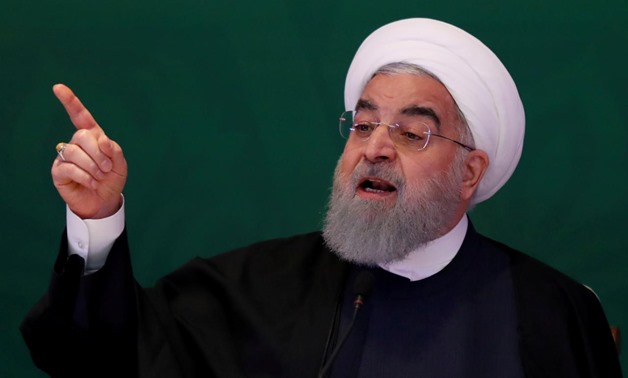
Iranian President Hassan Rouhani attends a meeting with Muslim leaders and scholars in Hyderabad, India, February 15, 2018.. (photo credit: REUTERS)
ANKARA - 9 May 2018: President Hassan Rouhani said on Tuesday that Iran would remain committed to a multinational nuclear deal despite U.S. President Donald Trump's decision to withdraw from the 2015 agreement designed to deny Tehran the ability to build nuclear weapons.
"If we achieve the deal's goals in cooperation with other members of the deal, it will remain in place. ... By exiting the deal, America has officially undermined its commitment to an international treaty," Rouhani said in a televised speech.
"I have ordered the foreign ministry to negotiate with the European countries, China and Russia in coming weeks. If at the end of this short period we conclude that we can fully benefit from the JCPOA with the cooperation of all countries, the deal would remain," he added.
The Joint Comprehensive Plan of Action (JCPOA) is the full name for the nuclear deal struck in 2015 between Iran, the five permanent members of the U.N. Security Council - the United States, Russia, China, Britain and France - and Germany.
Trump's decision sets the stage for a resurgence of political infighting within Iran’s complex power structure, Iranian officials told Reuters. It could tip the balance of power in favour of hardliners looking to constrain Rouhani's ability to open up to the West.
"They will blame Rouhani. ... They will continue their shenanigans at home and abroad. And they will have the U.S. to blame for the failure of the economy," said Abbas Milani, director of the Iranian Studies program at Stanford University.
Rouhani assured ordinary Iranians, frustrated by high unemployment and stagnant living standards, that Trump's decision would have no impact on Iran's oil-reliant economy.
"Our heroic people will not be affected by this psychological attack ... Iran's economic progress will continue. Our people should not be worried at all," he said.
Iran's ruling elite fears revival of anti-government protests in January that revealed the establishment was vulnerable to popular anger fueled by economic hardship. At least 21 people were killed in the protests.
TOUGH STATEMENT
Trump, in a tougher-than-expected statement, said he would reimpose economic sanctions on Tehran immediately. His decision puts pressure on his European allies, which are key backers of the deal and reluctant to join the United States in reimposing sanctions on Iran.
The U.S. Treasury said in a statement on its website that the United States would reimpose a wide array of Iran-related sanctions after the expiry of 90- and 180-day wind-down periods, including sanctions aimed at Iran's oil sector and transactions with its central bank.
Iran's supreme leader, Ayatollah Ali Khamenei, whose hostility towards Washington is the glue that holds together Iran’s faction-ridden leadership, had said Iran would "shred" the deal if the U.S. pulled out of it.
Rouhani warned that Iran was ready to resume its curbed nuclear activities if Iran's interests were not guaranteed under a deal without the United States.
"If needed, we will resume our nuclear enrichment at the industrial level without any limit," Rouhani said. "From now on, everything depends on Iran's national interests."
Under the 2015 deal, Iran stopped producing 20 percent enriched uranium and gave up the majority of its stockpile in return for most international sanctions on it being lifted.
"In response to U.S. persistent violations & unlawful withdrawal from the nuclear deal, as instructed by President Rouhani, I'll spearhead a diplomatic effort to examine whether remaining JCPOA participants can ensure its full benefits for Iran. Outcome will determine our response," Iran's foreign minister, Mohammad Javad Zarif, tweeted.
Trump's announcement was hailed by Washington's principal allies in the Middle East, Israel and Saudi Arabia, both sworn foes of Iran.


Comments
Leave a Comment